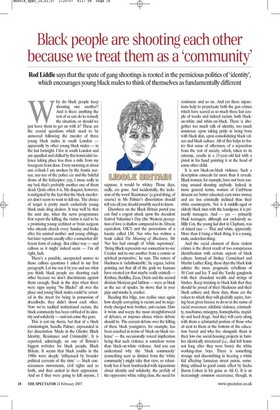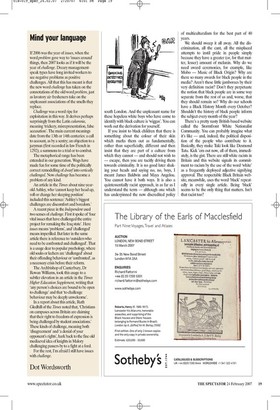Black people are shooting each other because we treat them as a 'community'
Rod Liddle says that the spate of gang shootings is rooted in the pernicious politics of 'identity', which encourages young black males to think of themselves as fundamentally different Ivhy do black people keep shooting one another? And is there anything the rest of us can do to remedy the situation, or should we just leave them to get on with it? These are the crucial questions which need to be answered following the murder of three young black males in south London — apparently by other young black males — in the last fortnight. I live in south London and am appalled and chilled by this homicidal violence taking place less than a mile from my bourgeois front door. Every morning at about one o'clock I am awoken by the frantic nurnur, nur-nur of the police car and the baleful drone of the helicopter; yep, I muse sadly in my bed, that's probably another one of them dead. Quite often it is. My disquiet, however, is mitigated by the fact that the black murderers don't seem to want to kill me. The choice of target is pretty much exclusively young black male drug dealers. It may well be that the next day, when the news programmes first report the killing, the victim is said to be a promising young architect or brain surgeon who attends church every Sunday and looks after his sainted mother and young siblings, but later reports usually offer a somewhat different form of eulogy. But either way — and callous as it might indeed seem — I'm all right, Jack.
There's a possible, unexpected answer to those callous questions I asked in my first paragraph. Let me run it by you and see what you think: black people are shooting each other because we don't discriminate against them enough. Back in the days when there were signs saying 'No Blacks!' all over the place and young black males could be arrested in the street for being in possession of dreadlocks, they didn't shoot each other. Now we've tackled institutional racism, the black community has been robbed of its identity and solidarity — and out come the guns.
This is not my thesis, but that of a black criminologist, Suzella Palmer, expounded in her dissertation 'Made in the Ghetto: Black Identity, Resistance and Criminality'. It is reported, admiringly, on one of Britain's biggest websites for black people, Black Britain. It seems that black youths in the 1980s were deeply 'influenced by broader political currents of the time' — black consciousness movements, civil rights and so forth, and thus united in their oppression. And so if they were going to kill anyone, I suppose, it would be whitey. Those days, sadly, are gone. And incidentally, the inclusion of the word 'Resistance' (a good thing, of course) in Ms Palmer's dissertation should tell you all you should possibly need to know.
Elsewhere on the Black Britain portal you can find a cogent attack upon the decadent festival Valentine's Day (the Western perception of love is shallow compared to its African equivalent, OK?) and the perorations of a lunatic called I.M. Nur who has written a book called The Meaning of Blackness. Mr Nur has had enough of 'white supremacy'. 'Being Black represents our connection to our Creator and to one another from a cosmic or spiritual perspective,' he says. The nature of blackness is 'unfathomable', he argues, before pointing out that all of the gods we humans have created (or that maybe really existed) — Krishna, Buddha, Zeus, Osiris and the second division Mexican god Lxtliton — were as black as the ace of spades. So shove that in your pipe and smoke it, cracker.
Reading this bilge, you realise once again how deeply corrupting is racism and its negatively charged twin brother, anti-racism. How it twists and warps the most straightforward of debates, or imposes silence where debate should be. The current debate over the killing of these black youngsters, for example, has been couched in terms of 'black-on-black violence' — the occasionally voiced implication being that such violence is somehow worse than black-on-white violence. And you can understand why the 'black community' (something seen as distinct from the 'white community') might take that view, so relentlessly has it been bombarded with injunctions about identity and solidarity, the perfidy of the oppressive white ruling class, the need for resistance and so on. And yet these injunctions help to perpetuate both the gun crimes which have scared us so much these last couple of weeks and indeed racism, both blackon-white and white-on-black. There is altogether too much talk of identity, too much insistence upon taking pride in being born with black skin, upon consolidating black values and black culture. All of this helps to foster that sense of otherness, of a separation from the rest of society, which, taken to its extreme, results in a 15-year-old kid with a pistol in his hand pointing it at the head of some other child.
It is not black-on-black violence. Such a description conceals far more than it reveals. Black women, for example, have not been running around shooting anybody. Indeed, in more general terms, women of Caribbean descent are better educated, earn more money and are less criminally inclined than their white counterparts. Nor is it middle-aged or elderly black men with the handguns; it is primarily teenagers. And — yes — primarily black teenagers, although not exclusively so. Billy Cox, the young lad shot in Clapham, was of mixed race — Thai and white, apparently. More than it being a black thing, it is a young, male, underclass thing.
And the racial element of these violent crimes is the direct result of too conspicuous identification with certain aspects of black culture. Instead of Stokey Carmichael and Martin Luther King, these days the black kids admire the more pragmatic rebellions of 50 Cent and Ice T and the Yardie ganglords with their abundant wealth and strings of bitches. Keep insisting to black kids that they should be proud of their blackness and their black culture and, these days, those are the values to which they will gleefully aspire, having been given licence to do so in the name of racial awareness nihilistic violence, criminality, machismo, misogyny, homophobia, stupidity and hard drugs. And they will carry along with them a substantial portion of those who sit next to them at the bottom of the education barrel and who live alongside them in their low-rise social-housing projects in families identically structured (i.e., dad left home not long after they were born): the white working-class boys. There is something strange and discomfiting in hearing a white kid affecting Jamaican street patois, something utilised to good comic effect by Sacha Baron Cohen in his guise as Ali G. It is an increasingly common occurrence, though, in south London. And the unpleasant name for these hopeless white boys who have come to identify with black culture is `wiggas'. You can work out the derivation for yourself.
If you insist to black children that there is something about the colour of their skin which marks them out as fundamentally, rather than superficially, different and then insist that they are part of a culture from which they cannot — and should not wish to — escape, then you are tacitly driving them towards criminality. It is no good later shaking your heads and saying no, no, boys, I meant James Baldwin and Maya Angelou. You cannot have it both ways. It is also a quintessentially racist approach, in as far as I understand the term — although one which has underpinned the now discredited policy of multiculturalism for the best part of 40 years.
We should sweep it all away. All the discrimination, all the cant, all the misplaced attempts to instil pride in people simply because they have a greater (or, for that matter, lesser) amount of melanin Why do we need award ceremonies, for example, like Mobo — Music of Black Origin? Why are there so many awards for black people in the media? Aren't these little jamborees by their very definition racist? Don't they perpetuate the notion that black people are in some way separate from the rest of us and, worse, that they should remain so? Why do our schools have a Black History Month every October? Shouldn't the history of black people inform the subject every month of the year?
There's a pretty nasty British-based website called the Stormfront White Nationalist Community. You can probably imagine what it's like — and, indeed, the political disposition of the people who contribute to it. Basically, they make Taki look like Desmond Tutu. Kick 'em out now, all of them, immediately, is the gist. There are still white racists in Britain and this website signals its commitment to racism by the use of the word 'white' as a frequently deployed adjective signifying approval. The respectable Black Britain website, meanwhile, uses the word 'black' repeatedly in every single article. Being 'black' seems to be the only thing that matters. Isn't that racist too?























































 Previous page
Previous page